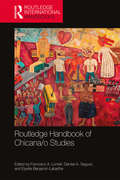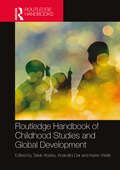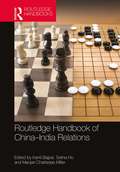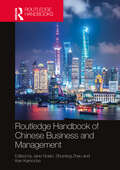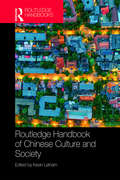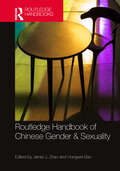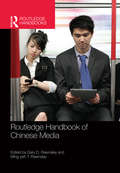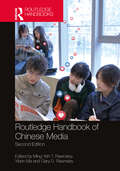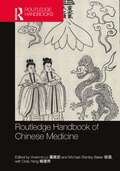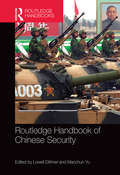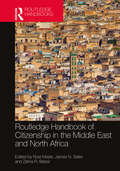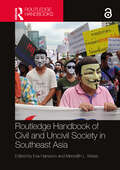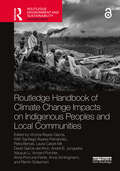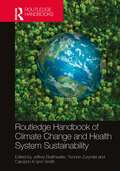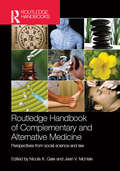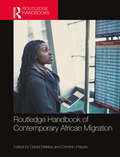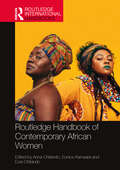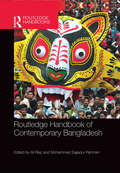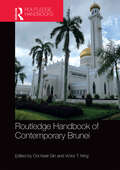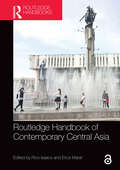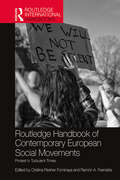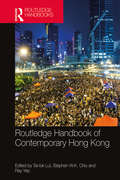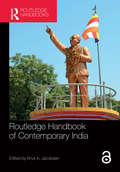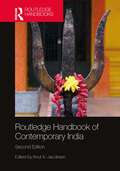- Table View
- List View
Routledge Handbook of Chicana/o Studies (Routledge International Handbooks)
by Francisco A. Lomelí Denise A. Segura Elyette Benjamin-LabartheThe Routledge Handbook of Chicana/o Studies is a unique interdisciplinary resource for students, libraries, and researchers interested in the largest and most rapidly growing racial-ethnic community in the United States and elsewhere which can either be identified as Chicano, Latino, Hispanic, or Mexican-American. Structured around seven comprehensive themes, the volume is for students of American studies, the Social Sciences, and the Humanities. The volume is organized around seven critical domains in Chicana/o Studies: Chicana/o History and Social Movements Borderlands, Global Migrations, Employment, and Citizenship Cultural Production in Global and Local Settings Chicana/o Identities Schooling, Language, and Literacy Violence, Resistance, and Empowerment International Perspectives The Handbook will stress the importance of the historical origins of the Chicana/o Studies field. Starting from myth of origins, Aztlán, alleged cradle of the Chicana/o people lately substantiated by the findings of archaeology and anthropology, over Spanish/Indigenous relations until the present time. Essays will explore cultural and linguistic hybridism and showcase artistic practices (visual arts, music, and dance) through popular (folklore) or high culture achievements (museums, installations) highlighting the growth of a critical perspective grounded on key theoretical formulations including borderlands theories, intersectionalities, critical race theory, and cultural analysis.
Routledge Handbook of Childhood Studies and Global Development
by Karen Wells Tatek Abebe Anandini DarThe Routledge Handbook of Childhood Studies and Global Development explores how global development agendas and processes of economic development influence children’s lives. It demonstrates that children are not only the frequent targets or objects of development but that they also shape and influence processes of economic, political and sociocultural development.The handbook makes the case for the importance of placing children at the heart of development debates and demonstrates how researchers, policymakers and practitioners can engage children in development. Through reports on field research as well as a critical engagement with theories in development studies and childhood studies, contributors contest normative assumptions about childhood and global development. They tease out and tease apart the complex social, historical, cultural, economic, epidemiological, ecological, geopolitical, and institutional processes transforming what it means to be young in the world today.Showcasing research from both established scholars and early career researchers, and with particular prominence given to the work of authors from the global south, this book will be an essential reference for policymakers, practitioners, and for researchers and students across childhood studies, education, geography, sociology, and global development.
Routledge Handbook of China–India Relations
by Manjari Chatterjee Miller Selina Ho Kanti BajpaiThe Routledge Handbook of China–India Relations provides a much-needed understanding of the important and complex relationship between India and China. Reflecting the consequential and multifaceted nature of the bilateral relationship, it brings together thirty-five original contributions by a wide range of experts in the field. The chapters show that China–India relations are more far-reaching and complicated than ever and marked by both conflict and cooperation. Following a thorough introduction by the Editors, the handbook is divided into seven parts which combine thematic and chronological principles: Historical overviews Culture and strategic culture: constructing the other Core bilateral conflicts Military relations Economy and development Relations with third parties China, India, and global order This handbook will be an essential reference work for scholars interested in International Relations, Asian Politics, Global Politics, and China–India relations.
Routledge Handbook of Chinese Business and Management
by Jane Nolan Ken Kamoche Shuming ZhaoThis handbook, representing the collaboration of 36 scholars, provides a multi-faceted exploration of Chinese business and management. The volume represents an ‘inside-out’ perspective, offering local knowledge and experience, in conjunction with an ‘outside-in’ approach, presenting measured and sensitive observations from an outsider’s perspective. The handbook’s approach is organised around five key themes: • Cultural and institutional contexts for business in China • Management, including digital marketing and entrepreneurship • Work and employment, covering gender and trade unions in the workplace • Human resource management and human resource development in Chinese businesses, including multinational corporations in the UK • Business and economic overviews, revealing the impact of guanxi relations and networks on Chinese business and management Revealing major recent developments in Chinese business and management alongside an appreciation of the unique historical, institutional, and cultural context of Chinese business and management, this book is a must-read for scholars, students, and educators of Chinese business and theory, and business in Asia.
Routledge Handbook of Chinese Culture and Society
by Kevin LathamThe Routledge Handbook of Chinese Culture and Society is an interdisciplinary resource that offers a comprehensive overview of contemporary Chinese social and cultural issues in the twenty-first century. Bringing together experts in their respective fields, this cutting-edge survey of the significant phenomena and directions in China today covers a range of issues including the following: State, privatisation and civil society Family and education Urban and rural life Gender, and sexuality and reproduction Popular culture and the media Religion and ethnicity Forming an accessible and fascinating insight into Chinese culture and society, this handbook will be invaluable to students and scholars across a range of disciplines, including anthropology, sociology, area studies, history, politics and cultural and media studies.
Routledge Handbook of Chinese Gender & Sexuality
by Jamie J. Zhao and Hongwei BaoThis Handbook offers a rich survey of topics concerning historical, modern and contemporary Chinese genders and sexualities.Exploring gender and sexuality as key dimensions of China’s modernisation and globalisation, this Handbook effectively situates Chinese gender and sexuality in transnational and transcultural contexts. It also spotlights nonnormative practices and emancipatory potentials within mainstream, heterosexual-dominated and patriarchally structured settings. It serves as a definitive study, research and resource guide for emerging gender and sexuality issues in the Chinese-speaking world. This Handbook covers interdisciplinary methodologies, perspectives and topics, including: History Literature Art Fashion Migration Translation Sex and desire Film and television Digital media Star and fan cultures Fantasies and lives of women and LGBTQ+ groups Social movements Transnational feminist and queer politics Paying acute attention to nonnormative genders and sexualities and emphasising the intersectionality of gender, sexuality, nationality, ethnicity and class, this Handbook offers an essential, field-defining text to Chinese gender and sexuality studies.
Routledge Handbook of Chinese Media
by Gary D. Rawnsley and Ming-yeh T. RawnsleyThe study of Chinese media is a field that is growing and evolving at an exponential rate. Not only are the Chinese media a fascinating subject for analysis in their own right, but they also offer scholars and students a window to observe multi-directional flows of information, culture and communications within the contexts of globalization and regionalization. Moreover, the study of Chinese media provides an invaluable opportunity to test and refine the variety of communications theories that researchers have used to describe, analyse, compare and contrast systems of communications. The Routledge Handbook of Chinese Media is a prestigious reference work providing an overview of the study of Chinese media. Gary and Ming-Yeh Rawnsley bring together an interdisciplinary perspective with contributions by an international team of renowned scholars on subjects such as television, journalism and the internet and social media. Locating Chinese media within a regional setting by focusing on ‘Greater China’, the People’s Republic of China, Taiwan, Hong Kong, Macau and overseas Chinese communities; the chapters highlight the convergence of media and platforms in the region; and emphasise the multi-directional and trans-national character of media/information flows in East Asia. Contributing to the growing de-westernization of media and communications studies; this handbook is an essential and comprehensive reference work for students of all levels and scholars in the fields of Chinese Studies and Media Studies.
Routledge Handbook of Chinese Media
by Ming-Yeh T. Rawnsley, Yiben Ma and Gary D. RawnsleyThe new, second edition of this successful Handbook explores the growing and evolving field of Chinese media, offering a window through which to observe multi-directional flows of information, culture and communications within the contexts of globalisation and regionalisation.Bringing together the research of an international and interdisciplinary team providing expert analysis of the media in China, Hong Kong, Taiwan and Macau, as well as among other Chinese communities, this new edition: Highlights how new social, economic and political forces have emerged to challenge the production and consumption of media outputs Reveals how the growing prevalence of social media, such as WeChat and TikTok, continues to blur the boundary between online and offline, allowing state institutions to interfere in the lives of their users and civil societies to mobilise and articulate their interests and grievances Outlines how the development of new communications technologies and their use by political and economic actors, journalists, civil societies and diaspora communities contribute to the complex multi-directional flow of information, culture and communications in the twenty-first century Contributing to the growing and evolving field of Chinese media studies, this Handbook is an essential and comprehensive reference work for students of all levels and scholars in the fields of Chinese Studies and Media Studies.
Routledge Handbook of Chinese Medicine
by Vivienne LoThe Routledge Handbook of Chinese Medicine is an extensive, interdisciplinary guide to the nature of traditional medicine and healing in the Chinese cultural region, and its plural epistemologies. Established experts and the next generation of scholars interpret the ways in which Chinese medicine has been understood and portrayed from the beginning of the empire (third century BCE) to the globalisation of Chinese products and practices in the present day, taking in subjects from ancient medical writings to therapeutic movement, to talismans for healing and traditional medicines that have inspired global solutions to contemporary epidemics. The volume is divided into seven parts: Longue Durée and Formation of Institutions and Traditions Sickness and Healing Food and Sex Spiritual and Orthodox Religious Practices The World of Sinographic Medicine Wider Diasporas Negotiating Modernity This handbook therefore introduces the broad range of ideas and techniques that comprise pre-modern medicine in China, and the historiographical and ethnographic approaches that have illuminated them. It will prove a useful resource to students and scholars of Chinese studies, and the history of medicine and anthropology. It will also be of interest to practitioners, patients and specialists wishing to refresh their knowledge with the latest developments in the field.
Routledge Handbook of Chinese Security
by Maochun Yu Lowell DittmerLocated in the center of Asia with one of the largest land frontiers in the world and 14 neighbors whose dispositions could not easily be predicted, China has long been obsessed with security. In this handbook, an internationally renowned team of contributors provide a comprehensive and systematic analysis of contemporary thinking about Chinese national security. Chapters cover the PRC's historical, ideological and doctrinal heritage related to security, its security arrangements and policies targeting key regions and nations of the world, the security aspects of the PRC's ground, air, sea, space and cyber forces, as well as the changing and expanding definition and scope of China's security theory and practice.
Routledge Handbook of Citizenship in the Middle East and North Africa
by James N. Sater Roel Meijer Zahra R. BabarThis comprehensive Handbook gives an overview of the political, social, economic and legal dimensions of citizenship in the Middle East and North Africa from the nineteenth century to the present. The terms citizen and citizenship are mostly used by researchers in an off-hand, self-evident manner. A citizen is assumed to have standard rights and duties that everyone enjoys. However, citizenship is a complex legal, social, economic, cultural, ethical and religious concept and practice. Since the rise of the modern bureaucratic state, in each country of the Middle East and North Africa, citizenship has developed differently. In addition, rights are highly differentiated within one country, ranging from privileged, underprivileged and discriminated citizens to non-citizens. Through its dual nature as instrument of state control, as well as a source of citizen rights and entitlements, citizenship provides crucial insights into state-citizen relations and the services the state provides, as well as the way citizens respond to these actions. This volume focuses on five themes that cover the crucial dimensions of citizenship in the region: Historical trajectory of citizenship since the nineteenth century until independence Creation of citizenship from above by the state Different discourses of rights and forms of contestation developed by social movements and society Mechanisms of inclusion and exclusion Politics of citizenship, nationality and migration Covering the main dimensions of citizenship, this multidisciplinary book is a key resource for students and scholars interested in citizenship, politics, economics, history, migration and refugees in the Middle East and North Africa.
Routledge Handbook of Civil and Uncivil Society in Southeast Asia
by Meredith L. Weiss Eva HanssonThe Routledge Handbook of Civil and Uncivil Society in Southeast Asia explores the nature and implications of civil society across the region, engaging systematically with both theoretical approaches and empirical nuance for a systematic, comparative, and informative approach. The handbook actively analyses the varying definitions of civil society, critiquing the inconsistent scrutiny of this sphere over time. It brings forth the need to reconsider civil society development in today’s Southeast Asia, including activist organisations' and platforms' composition, claims, resources, and potential to effect sociopolitical change. Structured in five parts, the volume includes chapters written by an international set of experts analysing topics relating to civil society: Spaces and platforms Place within politics Resources and tactics Identity formation and claims Advocacy The handbook highlights the importance of civil society as a domain for political engagement outside the state and parties, across Southeast Asia, as well as the prevalence and weight of 'uncivil' dimensions. It offers a well-informed and comprehensive analysis of the topic and is an indispensable reference work for students and researchers in the fields of Asian Studies, Asian Politics, Southeast Asian Politics and Comparative Politics.
Routledge Handbook of Climate Change Impacts on Indigenous Peoples and Local Communities (Routledge Environment and Sustainability Handbooks)
by Victoria Reyes-GarcíaThis Handbook examines the diverse ways in which climate change impacts Indigenous Peoples and local communities and considers their response to these changes. While there is well-established evidence that the climate of the Earth is changing, the scarcity of instrumental data oftentimes challenges scientists’ ability to detect such impacts in remote and marginalized areas of the world or in areas with scarce data. Bridging this gap, this Handbook draws on field research among Indigenous Peoples and local communities distributed across different climatic zones and relying on different livelihood activities, to analyse their reports of and responses to climate change impacts. It includes contributions from a range of authors from different nationalities, disciplinary backgrounds, and positionalities, thus reflecting the diversity of approaches in the field. The Handbook is organised in two parts: Part I examines the diverse ways in which climate change – alone or in interaction with other drivers of environmental change – affects Indigenous Peoples and local communities; Part II examines how Indigenous Peoples and local communities are locally adapting their responses to these impacts. Overall, this book highlights Indigenous and local knowledge systems as an untapped resource which will be vital in deepening our understanding of the effects of climate change. The Routledge Handbook of Climate Change Impacts on Indigenous Peoples and Local Communities will be an essential reference text for students and scholars of climate change, anthropology, environmental studies, ethnobiology, and Indigenous studies.
Routledge Handbook of Climate Change Impacts on Indigenous Peoples and Local Communities (Routledge Environment and Sustainability Handbooks)
by Victoria Reyes-GarcíaThis Handbook examines the diverse ways in which climate change impacts Indigenous Peoples and local communities and considers their response to these changes.While there is well-established evidence that the climate of the Earth is changing, the scarcity of instrumental data oftentimes challenges scientists’ ability to detect such impacts in remote and marginalized areas of the world or in areas with scarce data. Bridging this gap, this Handbook draws on field research among Indigenous Peoples and local communities distributed across different climatic zones and relying on different livelihood activities, to analyse their reports of and responses to climate change impacts. It includes contributions from a range of authors from different nationalities, disciplinary backgrounds, and positionalities, thus reflecting the diversity of approaches in the field. The Handbook is organised in two parts: Part I examines the diverse ways in which climate change – alone or in interaction with other drivers of environmental change – affects Indigenous Peoples and local communities; Part II examines how Indigenous Peoples and local communities are locally adapting their responses to these impacts. Overall, this book highlights Indigenous and local knowledge systems as an untapped resource which will be vital in deepening our understanding of the effects of climate change.The Routledge Handbook of Climate Change Impacts on Indigenous Peoples and Local Communities will be an essential reference text for students and scholars of climate change, anthropology, environmental studies, ethnobiology, and Indigenous studies.The Open Access version of this book, available at www.taylorfrancis.com, has been made available under a Creative Commons Attribution-Non Commercial-No Derivatives (CC-BY-NC-ND) 4.0 license.
Routledge Handbook of Climate Change and Health System Sustainability
by Jeffrey Braithwaite Yvonne Zurynski Carolynn K-lynn SmithThe Routledge Handbook on Climate Change and Health System Sustainability takes the reader on a journey to understand the interconnectedness of human health, climate change, and healthcare systems.The book begins by exploring how climate change is affecting human health through the increasing frequency of natural disasters, such as bush fires, droughts and heatwaves, and the emergence of new infectious diseases, such as the SARS-CoV2 virus, all of which drive up demand for health services that are already heavily burdened by increasing rates of chronic diseases and ageing populations. Chapters then turn to the contribution of the healthcare system itself to climate change— explaining how current clinical practices, including wasteful care of low value, create an unsustainable carbon footprint and threaten the very viability of healthcare systems. Throughout the volume, descriptions of practical solutions and implemented case studies are used to illustrate the feasibility of taking action in the real world of the healthcare delivery ecosystem.Bringing together a mix of forward-thinking environmental and health researchers, policymakers, leaders, managers, clinicians, patients, and health industry leaders to clarify the current state and future of sustainable healthcare systems, this book will be of interest to researchers and policymakers of climate and health systems.
Routledge Handbook of Complementary and Alternative Medicine: Perspectives from Social Science and Law
by Jean V. McHale Nicola K. GaleThe provision and use of traditional, complementary and alternative medicine (CAM) has been growing globally over the last 40 years. As CAM develops alongside - and sometimes integrates with - conventional medicine, this handbook provides the first major overview of its regulation and professionalization from social science and legal perspectives. The Routledge Handbook of Complementary and Alternative Medicine draws on historical and international comparative research to provide a rigorous and thematic examination of the field. It argues that many popular and policy debates are stuck in a polarized and largely asocial discourse, and that interdisciplinary social science perspectives, theorising diversity in the field, provide a much more robust evidence base for policy and practice in the field. Divided into four sections, the handbook covers: analytical frameworks power, professions and health spaces risk and regulation perspectives for the future. This important volume will interest social science and legal scholars researching complementary and alternative medicine, professional identify and health care regulation, as well as historians and health policymakers and regulators.
Routledge Handbook of Contemporary African Migration
by Daniel Makina and Dominic PasuraThis handbook provides an authoritative multidisciplinary overview of contemporary African international migration. It endeavours to present a single source of reference on issues such as migration history, trends, migrant profiles, narratives, migration-development nexus, migration governance, diasporas, impact of the COVID-19 pandemic, among others. The handbook assembles a multidisciplinary contributor team of distinguished and upcoming Africanist scholars, practitioners, researchers, and policy experts both inside and outside Africa to contribute their perspectives on contemporary African migration. It attempts to address some of the following pertinent questions: • What drives contemporary migration in Africa? • How are its patterns and trends evolving? • What is the architecture of migration governance in Africa? • How do migration, diaspora engagement and development play out in Africa? • What are the future trajectories of African migration? The handbook is a valuable resource for practitioners, politicians, researchers, university students, and academics interested in studying and understanding contemporary African migration.
Routledge Handbook of Contemporary African Women (Routledge International Handbooks)
by Ezra Chitando Anna Chitando Eunice KamaaraThe Routledge Handbook of Contemporary African Women highlights the achievements and progress being made by African women across a wide range of sectors in society. Without glossing over the very real challenges which women in Africa continue to face, this landmark handbook demonstrates how women across the continent are deploying their agency to achieve notable progress in areas as diverse as:• Pandemics• Climate Change• Science & Technology• Entrepreneurship• Higher Education• Youth & Older PeopleChallenging prevailing narratives and stereotypes about African women, this handbook provides a more positive perspective into African women’s progressive actions for sustainable development. It will be an essential read for readers across the fields of gender, environment, political science, history, development studies, religious studies and African Studies.
Routledge Handbook of Contemporary Bangladesh
by Ali Riaz Mohammad Sajjadur RahmanIn the past decade, Bangladesh has achieved significant social and economic progress. Despite high population density, a limited natural-resource base, underdeveloped infrastructure, frequent natural disasters and political uncertainty, the country has recorded positive developments in terms of broad economic and social indicators. This Handbook presents a comprehensive and interdisciplinary resource on the politics, society and economy of Bangladesh today. Divided into six thematic sections, the Handbook focuses on relevant issues and trends on: History and the making of contemporary Bangladesh Politics and institutions Economy and development Energy and environment State, society and rights Security and external relations Written by a team of international experts in the field, the chapters provide an accessible and up-to-date insight into contemporary Bangladesh. The Handbook will be of interest to students and academics of South Asian studies, as well as policymakers, journalists and others who wish to learn more about this increasingly important country.
Routledge Handbook of Contemporary Brunei
by Victor T. King Ooi Keat GinThe Routledge Handbook of Contemporary Brunei presents an overview of significant themes, issues, and challenges pertinent to Brunei Darussalam in the twenty-first century. Multidisciplinary in coverage, the contributions cover topics relating to philology, history, religion, language and literature, geography, international relations, economics, politics and sociocultural traditions. The Handbook is structured in eight parts: Foundations History Faith and Ethnicity Literature Language and Education Economics Material Culture Empowerment Chapters focus on the recent past and contemporary developments in this unique country that has remained a Malay Muslim sultanate, sustaining its religious and traditional heritage encapsulated in the national philosophy, Melayu Islam Beraja (MIB, Malay Islamic Monarchy). The MIB represents the sultanate’s three pillars of social, cultural, political and economic sustainability, and the contributors discuss this concept in relation to the notion of ‘Malay’ or ‘Malaydom’, the official religion of the nation-state, Islam and monarchy as the essential system of government. This Handbook is an invaluable reference work for students of Asian and Southeast Asian Studies and researchers interested in the smallest Association of Southeast Asian Nations (ASEAN) state.
Routledge Handbook of Contemporary Central Asia
by Rico Isaacs and Erica MaratThe Routledge Handbook of Contemporary Central Asia offers the first comprehensive, cross-disciplinary overview of key issues in Central Asian studies. The 30 chapters by leading and emerging scholars summarise major findings in the field and highlight long-term trends, recent observations and future developments in the region. The handbook features case studies of all five Central Asian republics and is organised thematically in seven sections: • History • Politics • Geography • International Relations • Political Economy • Society and Culture • Religion An essential cross-disciplinary reference work, the handbook offers an accessible and easyto- understand guide to the core issues permeating the region to enable readers to grasp the fundamental challenges, transformations and themes in contemporary Central Asia. It will be of interest to researchers, academics and students of the region and those working in the field of Area Studies, History, Anthropology, Politics and International Relations.
Routledge Handbook of Contemporary European Social Movements: Protest in Turbulent Times (Routledge International Handbooks)
by Ramón A. Feenstra Cristina Flesher FominayaEuropean social movements have become increasingly visible in recent years, generating intense public debates. From anti-austerity and pro-democracy movements to right-wing nationalist movements, these movements expose core conflicts around European democracy, identity, politics and society. The Routledge Handbook of Contemporary European Social Movements offers a comprehensive interdisciplinary overview of the analysis of European social movements, helping to orient scholars and students navigating a rapidly evolving field while developing a new agenda for research in the area. The book is divided into eight sections: Visions of Europe; Contemporary models of democracy; Historical evolution of major European movements; Feminism and sexualities; Movement diffusion within and beyond Europe; Anti-austerity movements; Technopolitical and media movements; and Movements, parties and movement-parties. Key theories and empirical trajectories of core movements, their central issues, debates and impacts are covered, with a focus on how these have influenced and been influenced by their European context. Democracy, and how social movements understand it, renew it, or undermine it, forms a core thread that runs through the book. Written in a clear and direct style, the Handbook provides a key resource for students and scholars hoping to understand the key debates and innovations unfolding in the heart of European social movements and how these affect broader debates on such areas as democracy, human rights, the right to the city, feminism, neoliberalism, nationalism, migration and European values, identity and politics. Extensive references and sources will direct readers to areas of further study.
Routledge Handbook of Contemporary Hong Kong
by Tai-Lok Lui Stephen W.K. Chiu Ray YepWhen Britain and China negotiated the future of Hong Kong in the early 1980s, their primary concern was about maintaining the status quo. The rise of China in the last thirty years, however, has reshaped the Beijing-Hong Kong dynamic as new tensions and divisions have emerged. Thus, post-1997 Hong Kong is a case about a global city’s democratic transition within an authoritarian state. The Routledge Handbook of Contemporary Hong Kong introduces readers to these key social, economic, and political developments. Bringing together the work of leading researchers in the field, it focuses on the process of transition from a British colony to a Special Administrative Region under China’s sovereign rule. Organized thematically, the sections covered include: ‘One Country, Two Systems’ in practice Governance in post-colonial Hong Kong Social mobilization The changing social fabric of Hong Kong society Socio-economic development and regional integration The future of Hong Kong. This book provides a thorough introduction to Hong Kong today. As such, it will be invaluable to students and scholars of Hong Kong’s politics, culture and society. It will also be of interest to those studying Chinese political development and the impact of China’s rise more generally.
Routledge Handbook of Contemporary India
by Knut A. JacobsenIndia is the second largest country in the world with regard to population, the world’s largest democracy and by far the largest country in South Asia, and one of the most diverse and pluralistic nations in the world in terms of official languages, cultures, religions and social identities. Indians have for centuries exchanged ideas with other cultures globally and some traditions have been transformed in those transnational and transcultural encounters and become successful innovations with an extraordinary global popularity. India is an emerging global power in terms of economy, but in spite of India’s impressive economic growth over the last decades, some of the most serious problems of Indian society such as poverty, repression of women, inequality both in terms of living conditions and of opportunities such as access to education, employment, and the economic resources of the state persist and do not seem to go away. This Handbook contains chapters by the field’s foremost scholars dealing with fundamental issues in India’s current cultural and social transformation and concentrates on India as it emerged after the economic reforms and the new economic policy of the 1980s and 1990s and as it develops in the twenty-first century. Following an introduction by the editor, the book is divided into five parts: Part I: Foundation Part II: India and the world Part III: Society, class, caste and gender Part IV: Religion and diversity Part V: Cultural change and innovations Exploring the cultural changes and innovations relating a number of contexts in contemporary India, this Handbook is essential reading for students and scholars interested in Indian and South Asian culture, politics and society.
Routledge Handbook of Contemporary India
by Knut A. JacobsenThis revised and updated new edition of the Routledge Handbook of Contemporary India concentrates on India as it emerged after the economic reforms and the new economic policy of the 1980s and 1990s and as it develops in the twenty-first century. It presents new developments and advancements in the research literature and includes discussions of the major political change in India since the Hindu nationalist party Bharatiya Janata Party (BJP) came to power in 2014. This Handbook contains chapters by the field’s foremost scholars dealing with fundamental issues in India’s current cultural and social transformation. This new edition also contains six new chapters on topics not covered by the first edition, such as changes caused by the Hindu majoritarian political ideology, the Hinduization process in the northeast of India and contemporary Dalit and Adivasi literatures. Following an introduction by the editor, the book is divided into five parts: Part I: Foundation Part II: India and the world Part III: Society, class, caste and gender Part IV: Religion and diversity Part V: Cultural change and innovations Exploring the cultural changes and innovations relating a number of contexts in contemporary India, this Handbook is essential reading for students and scholars interested in Indian and South Asian culture, politics and society.
